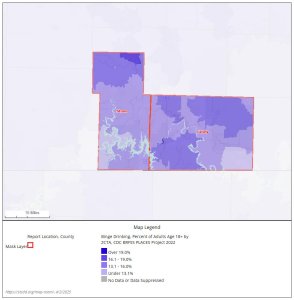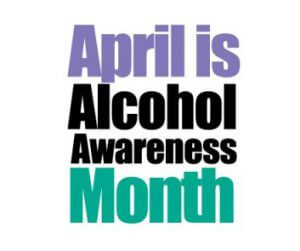April is Alcohol Awareness Month, a time to reflect on the impact of alcohol use and educate ourselves on the risks it can pose. One of the most dangerous forms of alcohol consumption is binge drinking, a pattern of excessive drinking in a short period of time, typically defined as five or more drinks in about two hours for men, and four or more for women. According to the CDC, binge drinking can lead to short-term effects such as injuries, violence, and alcohol poisoning, and long-term effects such as cancer, heart disease, liver disease, and stroke.
Map Room – Stone & Taney Counties Data Dashboard

This map shows the percentage of adults age 18 and older who report having five or more drinks (men) or four or more drinks (women) on an occasion in the past 30 days at zip code level in Stone and Taney counties. This data is from the Centers for Disease Control and Prevention, Behavioral Risk Factor Surveillance System (BRFSS) PLACES Project 2022
While it might seem like an occasional fun activity, binge drinking can have serious and long-lasting effects on your health, both physically and mentally. Binge drinking significantly increases the risk of alcohol poisoning, a life-threatening condition that can lead to coma or even death. Consuming alcohol rapidly overwhelms the body’s ability to process it, causing the blood alcohol concentration (BAC) to spike to dangerous levels.
Beyond the immediate risks, binge drinking has long-term health consequences. Chronic binge drinking is linked to liver diseases like cirrhosis, high blood pressure, and heart problems. The brain also suffers, with regular excessive drinking impairing memory, mood, and cognitive function. Mentally, binge drinking can contribute to depression and anxiety, as alcohol alters the brain’s chemical balance. The risk of substance use disorder rises, and individuals may develop unhealthy coping mechanisms to manage their emotions or stress. On top of health consequences, binge drinking is often associated with risky behaviors like unsafe driving, sexual disinhibition, violence, and accidents. It can also strain relationships with family, friends, and colleagues, leading to personal and professional issues.
During Alcohol Awareness Month, it’s crucial to acknowledge these risks and seek help if you or someone you know struggles with binge drinking. Support is available through counseling, therapy, and community programs, so don’t hesitate to reach out. Raising awareness and encouraging responsible drinking habits can make a lasting difference in combating the risks of binge drinking.
Contact the Substance Abuse and Mental Health Services Administration (SAMHSA) National Helpline at 1-800-662-HELP (4357) for the free, confidential, 24/7, 365-day-a-year treatment referral and information service (in English and Spanish) for individuals and families facing mental and/or substance use disorders.

